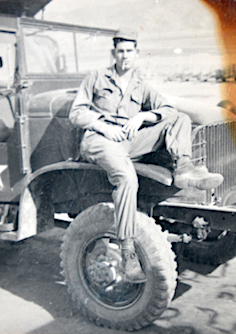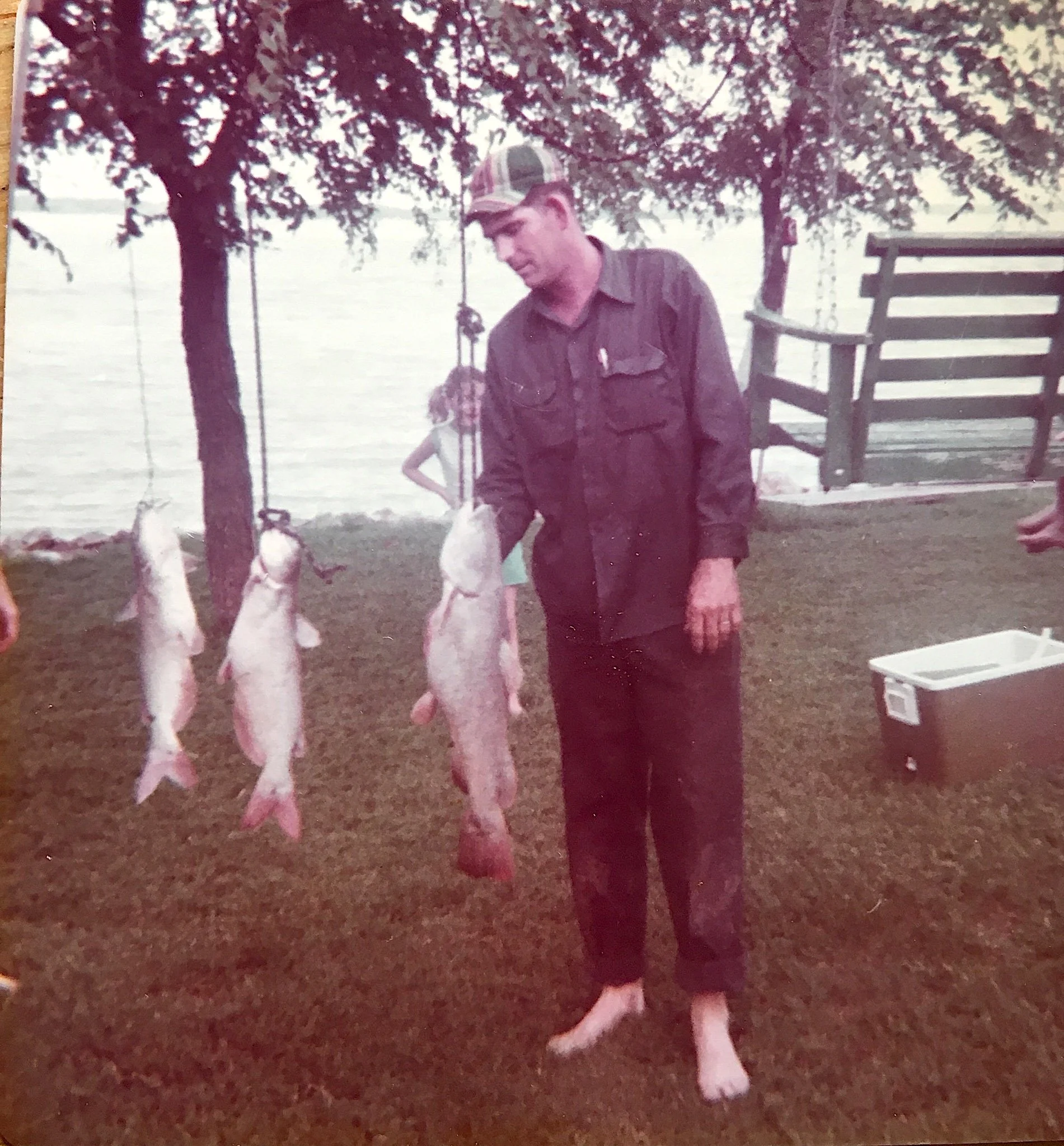Jim Sharp
Jim Sharp (Edgewood, Texas)
Jim Sharp was in the U.S. Army from 1951 – 1953. He served in Korea during wartime. “I was working in San Angelo, Texas as a cook in a hospital. People had tuberculosis and stuff like that and Uncle Sam called me. I was drafted into the Army and served two years. I went to boot camp at Fort Leonard in Missouri.”
Fort Leonard Wood is a U.S. Army training installation located in the Missouri Ozarks. The post was created in December 1940 and named in honor of General Leonard Wood in January 1941. Originally intended to train infantry troops, in 1941 it became an engineer training post with the creation of the Engineer Replacement Training Center. During World War II Italian and German POWs were interned at the fort. (Wikipedia)
“He made it thru the 8th grade. That is as far as he made it in school. His father left the family at an early age. He and his only brother quit school and took care of their mother. It was during the Depression and they had to take care of the family,” said Robert Sharp, Jim’s son.
“After boot camp I came home for two weeks and then they shipped be off to Korea. I was shipped off on the U.S. Naval Ship General Simon B. Buckner.” (TAP-123)
“It took less than a month and I remember we hit some rough water. We got our duffle bags and they lined us all up once we hit land. They told us what squad and bunk we were going to be in. We got up the next morning and ate breakfast and started marching to build our strength up to get ready to go fight, I guess,” said Jim.
“He worked for the state department for years and years,” said Robert. “He was a combat engineer when he went into the military.”
“We were near Soul, South Korea. I was in ‘A’ Company, 10th Engineers in the 3rd Infantry Division. It was very cold in Korea when we arrived. I remember we got up in the morning and our feet were frozen, we could hardly walk. Fortunately, I was driving an Army truck called a “Deuce and a half” and escaped a lot of the frostbite a lot of other Korean War Vets suffered,” said Jim showing me some of his pictures from Korea.
“He told me how cold it was there. His job was to build the bridges during the day and the North Koreans would come back and blow them up at night. These were the stationary bridges until they finally got the portable ones. He was really proud of working on the bridges and roads in Korea,” said Robert.
“I built bridges, bunkers and roads during my time in Korea. After about the first three or four weeks we started building floating bridges. That is when it started raining on us. It rained for 14 days and 14 nights. We had one big stationary bridge further down the river, all the rest were temporary floating bridges. We had five floating bridges on the river and we lost all five of them due to the rain. Huge trees were floating down the river and took the bridges we built with them. We almost lost the large bridge. We got a long dragline near the bridge and we picked up the trees and put them on the other side and they floated by,” said Jim recalling the hard work building those bridges.
“We did lose one of our LST’s because of all the flooding. The water eventually went down and we recovered the body of the driver,” and Jim paused to get his thoughts together. “We had all these deuce and a half’s and they had them stacked in there like cardboard. My job was to build the bridges that were used to transport all our military personal and vehicles across the rivers.
The hardest part for us building roads and bridges were the Koreans were on the other side of the river shooting tracers at us and we would shoot em back. I was shot at a few times and more than once we hit the ditches on the side of the road. The “JOES” or North Korean Army did not want us to build those bridges,” said Jim flipping the pages of his war album.
“He grew up on the farm so he was always comfortable being around and driving something big, like the dozers they used in Korea,” said his son Robert.
“I drove a Deuce and a half truck ( 2 ½ ton Army truck ) for about four months building roads and bridges around Korea. We were hauling gravel and dumping it for temporary roads. As quick as we dumped it the mortars started coming in. We dodged a lot of mortars. We heard the gravel and rocks hit the top of the cab. You could hear em coming. Many times, we hopped in the ditches and laid on our stomachs,” said Jim.
“He loved what he was doing and he loved the guys he was other there with. There was a lot of comradeship for the unit who he built the roads with,” said Robert.
“I also drove my Lieutenant in a jeep. He was my platoon leader. I drove him around for about six months and then the last six months I was there I pulled guard duty. I carried my M1 rifle everywhere I went. I was on a six- or eight-hour shift,” recalled Jim.
“You had to have so many points before you could come home. They eventually shipped us back to the states and put us on a troop train back to Abilene, Texas. I got my discharge papers and $300 mustering out pay,” smiled Jim.
“This guy, you don’t mess with him,” he said pointing out to his best friend in Korea.
“When my father goes thru his war albums he always mentions his best friend. His name was “Rochelle.” People knew not to mess with him because this guy would really take up for him. He was like a father to him,” said his daughter Deborah Bancroft.
“I didn’t like the Army, but it was my duty. If I was forty years younger I would do it again. I love this country. If feels good when someone comes up to me and thanks me for my military service,” said Jim with pride.
“He is a very proud veteran,” said Deborah. “He loves to wear his veteran cap and finds it interesting that people ask him about his hat and some people respect it and some ask him why he is wearing it. He will set them straight and tell them why he is wearing it,” said Deborah. “It is a love for his country and what he has done.”
“I learned discipline and how to take care of myself in the military,” said Jim. “He was a gentle giant. He was a very tall man. When he spoke you better listen and his stature made you want to listen to what he had to say,” said his daughter.
“The only food in the military I did not like was celery and peanut butter. I will eat the peanut butter off it but I will throw the celery away. I won’t tell you what we called it in the military,” and Jim laughed.
AFTER THE WAR
“I eventually went to Dallas to work. It was 1953 and I got a job putting up buildings for $1.05 an hour. There were a lot of jobs after the war. I worked for four or five years and made superintendent. I built steel buildings in Texas, Oklahoma, New Mexico and Louisiana for 13 years. Most of them are still standing. I was working for Stanton Construction Company. I then worked for a company in Garland that built machines that made lumber forms in construction until they laid us all off. I stayed there for three years and for the next 13 years I worked on water and oil drilling rigs. They eventually sold out to another company and was laid off again. I was two years from being old enough to retire.
I then cut wood around Edgewood for two years making more money than I did in Dallas. After that I was able to retire,” said Jim with a big smile.
“My wife was still working for Sears and Roebuck in the custom-made drapery department in Garland, Texas.
We got married at her family’s house in Edgewood, Texas,” said an emotional Jim. I met Jim and Annette when they visited the Veterans Memorial in Canton a couple of months earlier.
During the time I met the couple and our interview, his wife had passed away and this was a very emotional time for Jim. He was married to Annette for 64 years.
ON RETIREMENT
“I enjoy fishing and have most of my life. I love to fish for channel catfish. Lake Tawakoni is my favorite. There are a lot of catfish in that lake. I have a boy, Robert, that is retired and he lives in Paris, Texas. We have four catfish trips already set up for this year,” said Jim.
“That is all we ever did was go catfishing on Friday nights,” said Robert smiling. “We would go all night long. That is his favorite pastime, fishing. It doesn’t matter whether he catches any or not, it is just that he is on the water fishing.”
“The biggest catfish I ever caught was 86 pounds,” beamed Jim. “I caught him out of Lake Ray Hubbard in Dallas. I took him over to the Bay house on I-30 in put him in a big ole vat. I left him for about two weeks. That is time enough for them to clean themselves out. I hung him up on a tree from his bottom lip and cut his tail off. I let him lay there and bleed out. I then skin and gutted him. Didn’t try to cut him up right then because you don’t want to cut that fat meat up when they are fresh. I then put him in the ice box for about three hours. I then cut all the fat off him and cut him up like steaks.
The bigger ones are good eating you just gotta know how to clean em. The best size catfish to eat are the five pounders.”
“I was there the day he caught the 86 pounder,” said Robert. “It was a huge fish. I have been with him when he caught several fifty pounders. He and another friend designed a special kind of trotline for catfish. He also came up with a canning process for catfish. It turned out pretty good. He gets excited when he catches the big ones like that.”
SECRET TO A LONG LIFE
“Take care of yourself and watch what you eat, is the secret to a long life,” according to Jim. “He is probably one of the most caring people I know. I could have never asked for a better father. He made sure we travelled the right road. He was always concerned of who we were and what we were going to be,” said his son Robert.
“He was a very loving and kind father and always there for you. He loved his wife and family. He also loved the outdoors, whether it be camping, fishing or boating. He always loved to hunt but his biggest love is fishing,” said his daughter Deborah.
“One of the things on my bucket list is to go to Colorado and go deer hunting. I have been there twice and want to go back. I just like the mountains,” said Jim looking and smiling out across Highway 80.
Thank you, Jim Sharp, for your service to our country. Thank you for serving during our countries time of war in Korea. Phil Smith
GOD BLESS OUR VETERANS AND GOD BLESS AMERICA
NOTE: Meet other Veterans from Van Zandt County by going to the top of this page and click on MEET OUR VETERANS and click one of the (5) branches of services and the veterans last name first and click to read.
“Every Veteran has a story to tell.” Phil Smith
(ALL photos on this Facebook page are ©2019, Phil Smith and Van Zandt County Veterans Memorial. NO unauthorized use without permission) All Rights Reserved












